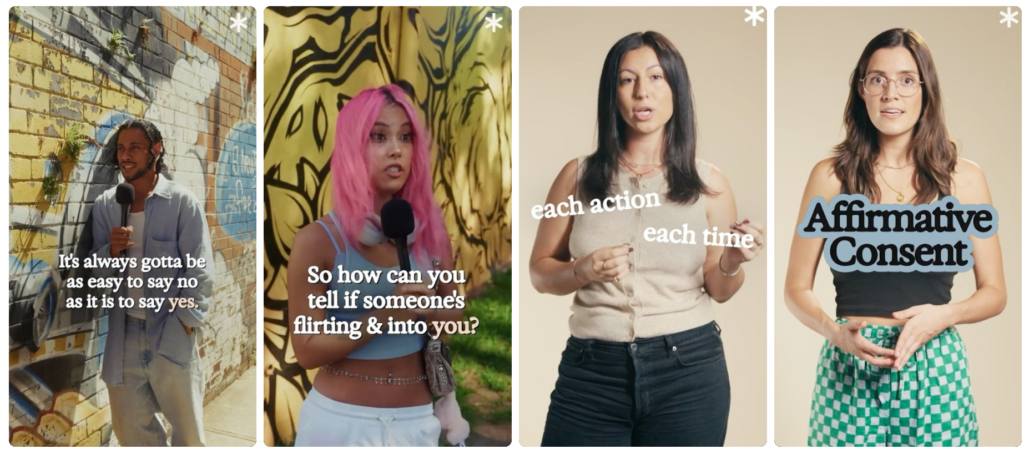TW: Discussion of sexual assault
Four years ago, Chanel Contos launched a petition that called for more thorough and earlier education consent. This week, her organisation Teach Us Consent launches a groundbreaking initiative – and they’re not stopping anytime soon.
ICYMI: This week, Teach Us Consent has announced the Promoting Consent Initiative (PCI) – a new approach to consent education. PCI is funded by the Department of Social Services as part of the The National Plan to End Violence against Women and Children 2022-2032.
As part of the PCI – the first of its kind in Australia – 25 highly influential young Australians – ranging from footy players, to comedians, advocates to beauty vloggers have been engaged to help demonstrate the importance of having these vulnerable and open conversations. The talent lineup includes leading figures Darcy Moore, Blake Pavey, Maggie Zhou, Mitch Greer and Brooke Blurton.

Chanel says that the PCI was a natural next step for Teach Us Consent. “At Teach Us Consent, we’re driven by our vision for a culture where empathy, respect and affirmative consent are the norm. It all started in 2021 with a single Instagram story post, which led to a national curriculum change,” she tells Missing Perspectives.
“Now, we’re steadfast on empowering young people to create respectful relationships in their own lives. Through these new resources, we’re taking consent education to the next level by equipping young people with the skills they need to put consent into practice; from supplying scripts to give and ask for consent and clarifying the nuances of what a “boundary” is, to educating young Australians about porn and media literacy in the digital age.”
The PCI has been described as an innovative approach to a long-standing problem of outdated and illequipped consent education – and a key component of this new strategy is to meet young people where they are at – including podcasting, TikToks, Instagram posts, essays, and YouTube. “The pervasive problem of sexual violence is one that is, devastatingly, not new. But our approach to combatting sexual violence is. At Teach Us Consent, we acknowledge that, in order for us to truly eradicate sexual violence, we have to be innovative, and pioneer new ways to truly engage young Australians,” Chanel explains.
“According to the latest Australian Child Maltreatment Study, the rate of sexual violence perpetrated by adults is decreasing, but that which is perpetrated by adolescents is increasing. And emerging research tells us that boys and young men feel they don’t have many positive role models on social media. So, we’re amplifying the voices of some brilliant young people from across the country to bring them into the conversation.
“That’s why these resources are done differently. As an Australian first, we’ve engaged over 25 highly influential young people to share essential messages around consent, sex and relationships, and we’re sharing these resources in a range of online spaces; from TikTok and Instagram, to YouTube, Spotify and beyond.”
Chanel says that the Teach Us Consent team embraced the fact that people trust, admire and frequently engage with the people they follow online. So, by engaging a range of different influential people to have conversations around consent – from footy players and comedians to fashion vloggers – Chanel explains, that “we’re telling their audiences that they belong in these conversations too.”
“We’re modelling open, vulnerable, and imperfect conversations on our podcasts. The initiative platforms crucial conversations about consent with young men – not just about them.”
As part of the PCI, the Teach Us Consent team also worked closely with First Nations communities, and made sure that PCI content was culturally and linguistically inclusive. To Chanel, it was a “non-negotiable”.
“We know that Aboriginal and Torres Strait Islander people experience disproportionate rates of gender-based violence, including sexual violence. Target 13 in the National Agreement on Closing the Gap is dedicated to reducing the rate of all forms of family violence against First Nations women and children by at least 50 per cent by 2031. That’s why having resources made by and for First Nations young people as part of this initiative was non-negotiable.”
Next week, the PCI be launching resources specifically for First Nations communities, in collaboration with Aboriginal-led creative agency, 33 Creative. The new release will include a First Nations Consent Guide, Reels, TikToks and a long-form article, specific for First Nations communities. Chanel says that the resources will be available on the Teach Us Consent website and through IndigiTube – an offline video consumption tool. They have also ensured key materials are translated into six different languages, including Torres Strait Creole, so consent education “can be accessed by as many young people in this country as possible”.
Launching the PCI and scaling Teach Us Consent has been a pinch-me moment for Chanel. “I’m so proud of what we’ve created here,” she says. “This could be the blueprint for how consent and respectful relationships education is taught across the rest of the world. The Albanese Government took a leap of faith in funding this initiative. They recognised we had to do things differently to create real change.”
Reflecting over the the last four years, Chanel she’s learned a lot of lessons around change-making along the way. “If you surround yourself with good people, change-making feels easy and momentum and support grows quickly,” she says.
As to what keeps her hopeful, particularly about the next generation growing up in Australia – Chanel says it’s simple.
“We are shredding shame, we are more privy to these issues than ever, and there’s a whole new generation of parents and teachers completely committed to doing something about it.”
If this article raises any concerns for you, please call 1800RESPECT for around the clock counselling and support. Alternatively, you can call Lifeline on 13 11 14.

